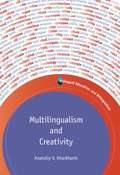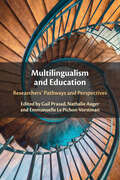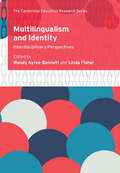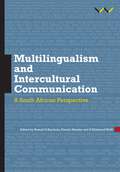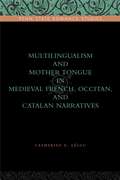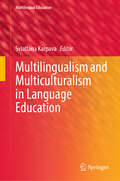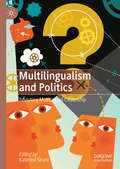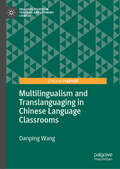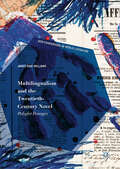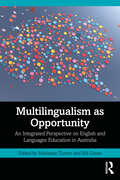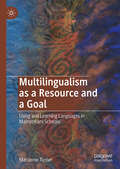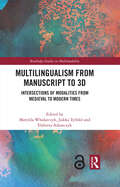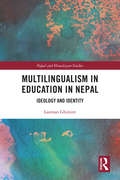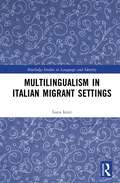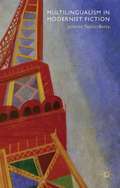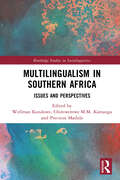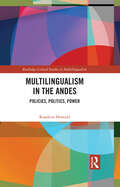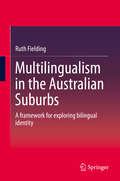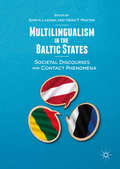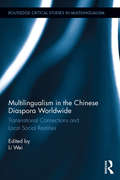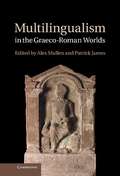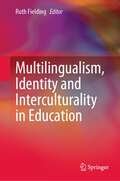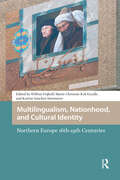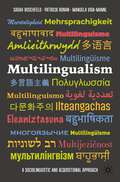- Table View
- List View
Multilingualism and Creativity
by Anatoliy V. KharkhurinIn this monograph, Anatoliy V. Kharkhurin presents the results of his empirical investigation into the impact of multilingual practice on an individual's creative potential. Until now, the relationship between these two activities has received little attention in the academic community. The book makes an attempt to resuscitate this theme and provides a solid theoretical framework supported by contemporary empirical research conducted in a variety of geographic, linguistic, and sociocultural locations. This study demonstrates that several factors - such as the multilinguals' age of language acquisition, proficiency in these languages and experience with cultural settings in which these languages were acquired - have a positive impact on selective attention and language mediated concept activation mechanisms. Together, these facilitate generative and innovative capacities of creative thinking. This book will be of great interest not only to scholars in the fields of multilingualism and creativity, but also to educators and all those interested in enhancing foreign language learning and fostering creativity.
Multilingualism and Education: Researchers' Pathways and Perspectives
by Gail Prasad Nathalie Auger Le Pichon-Vorstman, EmmanuelleFor decades, international researchers and educators have sought to understand how to address cultural and linguistic diversity in education. This book offers the keys to doing so: it brings together short biographies of thirty-six scholars, representing a wide range of universities and countries, to allow them to reflect on their own personal life paths, and how their individual life experiences have led to and informed their research. This approach highlights how theories and concepts have evolved in different contexts, while opening up pedagogical possibilities from diverse backgrounds and enriched by the life experiences of leading researchers in the field. Beyond these questions, the book also explores the dynamic relationships between languages, power and identities, as well as how these relationships raise broader societal issues that permeate both global and local language practices. It is essential reading for students, teacher educators, and researchers interested in the impact of multilingualism on education.
Multilingualism and Identity: Interdisciplinary Perspectives (Cambridge Education Research)
by Linda Fisher Wendy Ayres-BennettThe analysis and understanding of multilingualism, and its relationship to identity in the face of globalization, migration and the increasing dominance of English as a lingua franca, makes it a complex and challenging problem that requires insights from a range of disciplines. With reference to a variety of languages and contexts, this book offers fascinating insights into multilingual identity from a team of world-renowned scholars, working from a range of different theoretical and methodological perspectives. Three overarching themes are explored – situatedness, identity practices, and investment – and detailed case studies from different linguistic and cultural contexts are included throughout. The chapter authors' consideration of 'multilingualism-as-resource' challenges the conception of 'multilingualism-as-problem', which has dogged so much political thinking in late modernity. The studies offer a critical lens on the types of linguistic repertoire that are celebrated and valued, and introduce the policy implications of their findings for education and wider social issues.
Multilingualism and Intercultural Communication: A South African perspective
by H. Ekkehard Wolff Russell H Kaschula Pamela Maseko Christine Anthonissen Bassey E AntiaAn in-depth look at the changing sociolinguistic dynamics that have influenced South African society. To date, there has been no published textbook which takes into account changing sociolinguistic dynamics that have influenced South African society. Multilingualism and Intercultural Communication breaks new ground in this arena. The scope of this book ranges from macro-sociolinguistic questions pertaining to language policies and their implementation (or non-implementation) to micro-sociolinguistic observations of actual language-use in verbal interaction, mainly in multilingual contexts of Higher Education (HE). There is a gradual move for the study of language and culture to be taught in the context of (professional) disciplines in which they would be used, for example, Journalism and African languages, Education and African languages, etc. The book caters for this growing market. Because of its multilingual nature, it caters to English and Afrikaans language speakers, as well as the Sotho and Nguni language groups _ the largest languages in South Africa [and also increasingly used in the context of South African Higher Education]. It brings together various inter-linked disciplines such as Sociolinguistics and Applied Language Studies, Media Studies and Journalism, History and Education, Social and Natural Sciences, Law, Human Language Technology, Music, Intercultural Communication and Literary Studies. The unique cross-cutting disciplinary features of the book will make it a must-have for twenty-first century South African students and scholars and those interested in applied language issues.
Multilingualism and Mother Tongue in Medieval French, Occitan, and Catalan Narratives (Penn State Romance Studies #11)
by Catherine E. LégluThe Occitan literary tradition of the later Middle Ages is a marginal and hybrid phenomenon, caught between the preeminence of French courtly romance and the emergence of Catalan literary prose. In this book, Catherine Léglu brings together, for the first time in English, prose and verse texts that are composed in Occitan, French, and Catalan-sometimes in a mixture of two of these languages. This book challenges the centrality of "canonical" texts and draws attention to the marginal, the complex, and the hybrid. It explores the varied ways in which literary works in the vernacular composed between the twelfth and fifteenth centuries narrate multilingualism and its apparent opponent, the mother tongue. Léglu argues that the mother tongue remains a fantasy, condemned to alienation from linguistic practices that were, by definition, multilingual. As most of the texts studied in this book are works of courtly literature, these linguistic encounters are often narrated indirectly, through literary motifs of love, rape, incest, disguise, and travel.
Multilingualism and Multiculturalism in Language Education (Multilingual Education #49)
by Sviatlana KarpavaThis volume focuses on multidisciplinary approaches to multilingualism, multiculturalism and language teaching and learning at (pre)primary, secondary and tertiary levels. It addresses both top-down and bottom-up perspectives on language education policies, teacher training and preparation. The book explores the needs and challenges related to education in multilingual classrooms, the relationship between parents and educators, and linguistic and cultural diversity in classrooms. It draws on the findings of research that has been conducted worldwide including in Cyprus, USA, UK, Scotland, Spain, France, Sri Lanka, Slovenia, Australia, New Zealand, Indonesia, Hong Kong, Sweden, Greece, and Italy. This book is ideal for students of (applied) linguistics, (socio)linguistics, psycholinguistics, language acquisition and education, as well as practitioners, teachers, parents, experts and researchers wishing to update their knowledge regarding multilingualism, multiculturalism, language learning, and teaching.
Multilingualism and Politics: Revisiting Multilingual Citizenship
by Katerina StraniThis edited book makes a significant contribution to the relatively under-explored field of multilingualism and politics, approaching the topic from two key perspectives: multilingualism in politics, and the politics of multilingualism. Through the lens of case studies from around the world, the authors in this volume combine theoretical and empirical insights to examine the inter-relation between multilingualism and politics in different spheres and contexts, including minority language policy, national identity, the translation of political debates and discourse, and the use of multiple, often competing languages in educational settings. This book will be of interest to students and scholars in the fields of politics, sociology, sociolinguistics, language policy, and translation and interpreting studies.
Multilingualism and Translanguaging in Chinese Language Classrooms (Palgrave Studies in Teaching and Learning Chinese)
by Danping WangThis book presents new research on Chinese as a Second Language (CSL) teaching from an ethnographic classroom study on classroom translanguaging practices that highlights the policy and pedagogical implications of adopting a creative and principled multilingual approach. Drawing on a case study from Hong Kong, it analyses naturally observed language patterns in CSL classrooms and the attitudes of students and teachers towards prescribed classroom language policies, and thereby demonstrates the importance of mixing Chinese, English and students’ home languages to achieve successful second language learning. It discusses the nature and guiding principles for classroom translanguaging research and provides research tools that will enable second language teachers to examine their own language practices. The author argues persuasively that second language teaching practices and policies must reflect the current reality of language use and the diverse learning needs of multilingual students. This book will appeal to teacher educators and researchers in fields such as second language acquisition, foreign language teaching and language policy.
Multilingualism and the Twentieth-Century Novel: Polyglot Passages (New Comparisons in World Literature)
by James Reay WilliamsThis book argues that the Anglophone novel in the twentieth century is, in fact, always multilingual. Rooting its analysis in modern Europe and the Caribbean, it recognises that monolingualism, not multilingualism, is a historical and global rarity, and argues that this fact must inform our study of the novel, even when it remains notionally Anglophone. Drawing principally upon four authors – Joseph Conrad, Jean Rhys, Wilson Harris and Junot Díaz – this study argues that a close engagement with the novel reveals a series of ways to apprehend, depict and theorise various kinds of language diversity. In so doing, it reveals the presence of the multilingual as a powerful shaping force for the direction of the novel from 1900 to the present day which cuts across and complicates current understandings of modernist, postcolonial and global literatures.
Multilingualism as Opportunity: An Integrated Perspective on English and Languages Education in Australia
by Bill Green Marianne TurnerThis book addresses how language is conceptualised in Australian schooling to deliver a better understanding of how multilingualism can be incorporated into everyday teaching and learning, practice and policy. By integrating different educational domains – namely, subject English, teaching English to speakers of other languages (TESOL), Languages as a subject area, and the learning of languages across the curriculum – the text (re-)frames language(s) learning for all students, including first-generation immigrants, international students, students born in Australia to immigrant parents, and students with no exposure to other languages at home. It is distinctive in that it brings together scholars from across the L1 and L2 fields. Presenting a novel framework that addresses the positioning of both language and opportunity across different domains at school, this book offers a multilingual vision for all teachers. The Australian setting depicted serves as a rich and distinctive example for similar contexts worldwide.This is an invaluable resource for students and academics in disciplines related to language(s) and education, as well as teacher educators, school leaders, and practitioners.
Multilingualism as a Resource and a Goal: Using and Learning Languages in Mainstream Schools
by Marianne TurnerThis book explores multilingualism as a resource and goal at school in contexts of student diversity and institutional monolingualism. Combining translanguaging theory and sociocultural theory, the author proposes a framework for the learning and use of both foreign and heritage languages across the curriculum in mainstream schools. By clearly linking language practices to teaching and learning objectives, the book aims to support school leaders and practitioners make informed decisions about how best to promote multilingualism in their school, as well as to enhance the learning outcomes of bi/multilinguals. In addition to school leaders and practitioners, it will be of interest to students and academics in the fields of bilingual education and TESOL, as well as applied linguistics and language teaching more broadly.
Multilingualism from Manuscript to 3D: Intersections of Modalities from Medieval to Modern Times (Routledge Studies in Multimodality)
by Matylda Włodarczyk Jukka Tyrkkö Elżbieta AdamczykThis collection explores the links between multimodality and multilingualism, charting the interplay between languages, channels, and forms of communication in multilingual written texts from historical manuscripts through to the new media of today and the non-verbal associations they evoke. The volume argues that features of written texts such as graphics, layout, boundary marking, and typography are inseparable from verbal content. Taken together, the chapters adopt a systematic historical perspective to investigate this interplay over time and highlight the ways in which the two disciplines might further inform one another in the future as new technologies emerge. The first half of the volume considers texts where semiotic resources are the sites of modes, where multiple linguistic codes interact on the page and generate extralinguistic associations through visual features and spatial organizaisation. The second half of the book looks at texts where this interface occurs not in the text but rather in the cultural practices involved in social materiality and text transmission. Enhancing our understandings of multimodal resources in both historical and contemporary communication, this book will be of interest to scholars in multimodality, multilingualism, historical communication, discourse analysis, and cultural studies.
Multilingualism in Education in Nepal: Ideology and Identity (Nepal and Himalayan Studies)
by Laxman GhimireThis book explores the development of multilingual policy in education in Nepal in sociopolitical and historical contexts and examines the frameworks of language use in schools. It investigates the dynamics and factors that influence the process of construction and appropriation of the policy of multilingualism in education. The book surveys the language situation in schools and discusses how it is impacted by local language positions, societal power relations, ideological and identity contestations, and the attitude, language behaviour and resistance of key actors. It highlights the role of pedagogy, linguistics and politics that govern the policy of multilingual education. The author assesses the prospects of a multilingual approach to learning via teacher preparation, curriculum and learning material development, coordination of actors and institutions, and resources available in schools. The book presents Nepal’s linguistic background while discussing how multilingualism in education recognises local languages to improve the quality of learning in classrooms in ethnolinguistic communities. Evaluating the use of local languages in classrooms, it explores monolingual, multilingual and language maintenance frameworks of multilingualism in education. This book will be of interest to teachers, students, and researchers of education and educational studies, linguistics, sociology of education, school education, language studies, sociolinguistics, language policy and planning, public administration, ethnolinguistics, and sociology of language. It will also be useful to educationists, policymakers, linguists, sociolinguists and those working in related areas.
Multilingualism in Italian Migrant Settings (Routledge Studies in Language and Identity)
by Luca IezziMultilingualism in Italian Migrant Settings investigates the plural linguistic practices of the migrants in a particular refugee centre in Italy, the CAS (centri di accoglienza straordinaria; “extraordinary refugee centre”).This book offers a practical and rigorous study of contact situations surrounding migrants from areas with complex repertoires. Language is inherently connected to migration, especially through its role as a principal tool for communication.This volume places multilingualism in migratory contexts to comprehend how plurilingual migrants move freely between languages, and to evaluate their role in the linguistic landscape of the host country.This monograph will appeal to scholars specialising in sociolinguistics and contact linguistics. The volume will also be informative for postgraduate students in the field of sociolinguistics, with a focus on migration and language use.
Multilingualism in Modernist Fiction
by Juliette Taylor-BattyThis new study argues that modernist literature is characterised by a 'multilingual turn'. Examining the use of different languages in the fiction of a range of writers, including Lawrence, Richardson, Mansfield, Rhys, Joyce and Beckett, Taylor-Batty demonstrates the centrality of linguistic plurality to modernist forms of defamiliarisation.
Multilingualism in Southern Africa: Issues and Perspectives (Routledge Studies in Sociolinguistics)
by Wellman Kondowe Kamanga, Chimwemwe M.M. Precious MadulaThis collection showcases perspectives from established and emerging scholars on the contemporary landscape of multilingualism in Southern Africa. The book explores the broader impact of colonialism and neocolonialism on language policies and practices, drawing on case studies from such countries as Malawi, South Africa, Tanzania, Zimbabwe and Zambia.The volume is organised thematically around four different sections, looking at issues around linguistic diversity across different sectors including contemporary debates on African languages, language education, youth languages and language documentation. Taken together, the collection seeks to offer readers with a more nuanced understanding of fundamental issues in the development of multilingualism across different countries in Southern Africa today and encourage future research on multilingualism in Africa more broadly. The volume will be of interest to students and scholars in multilingualism, sociolinguistics, language policies, language education and African studies.
Multilingualism in the Andes: Policies, Politics, Power (Routledge Critical Studies in Multilingualism)
by Rosaleen HowardThis illuminating book critically examines multicultural language politics and policymaking in the Andean-Amazonian countries of Ecuador, Peru, and Bolivia, demonstrating how issues of language and power throw light on the relationship between Indigenous peoples and the state. Based on the author’s research in Ecuador, Peru, and Bolivia over several decades, Howard draws comparisons over time and space. With due attention to history, the book’s focus is situated in the years following the turn of the millennium, a period in which ideological shifts have affected continuity in official policy delivery even as processes of language shift from Indigenous languages such as Aymara and Quechua, to Spanish, have accelerated. The book combines in-depth description and analysis of state-level activity with ethnographic description of responses to policy on the ground. The author works with concepts of technologies of power and language regimentation to draw out the hegemonic workings of power as exercised through language policy creation at multiple scales. This book will be key reading for students and scholars of critical sociolinguistic ethnography, the history, society and politics of the Andean region, and linguistic anthropology, language policy and planning, and Latin American studies more broadly.
Multilingualism in the Australian Suburbs
by Ruth FieldingThis book introduces a framework for examining bilingual identity and presents the cases of seven individual children from a study of young students' bilingual identities in an Australian primary school. The new Bilingual Identity Negotiation Framework brings together three elements that influence bilingual identity development - sociocultural connection, investment and interaction. The cases comprise individual stories about seven young, bilingual students and are complemented by some more general investigations of bilingual identity from a whole class of students at the school. The framework is explained and supported using the students' stories and offers readers a new concept for examining and thinking about bilingual identity. This book builds upon past and current theories of identity and bilingualism and expands on these to identify three interlinking elements within bilingual identity. The book highlights the need for greater dialogue between different sectors of research and education relating to languages and bilingualism. It adds to the increasing call for collaborative work from the different fields interested in language learning and teaching such as TESOL, bilingualism, and language education. Through the development of the framework and the students' stories in this study, this book shows how multilingual children in one school in Australia developed their identities in association with their home and school languages. This provides readers with a model for examining bilingual identity in their own contexts, or a theoretical construct to consider in their thinking on bilingualism, language and identity.
Multilingualism in the Baltic States: Societal Discourses And Contact Phenomena
by Heiko F. Marten Sanita LazdiņaThis edited collection provides an overview of linguistic diversity, societal discourses and interaction between majorities and minorities in the Baltic States. It presents a wide range of methods and research paradigms including folk linguistics, discourse analysis, narrative analyses, code alternation, ethnographic observations, language learning motivation, languages in education and language acquisition. Grouped thematically, its chapters examine regional varieties and minority languages (Latgalian, Võro, urban dialects in Lithuania, Polish in Lithuania); the integration of the Russian language and its speakers; and the role of international languages like English in Baltic societies. The editors’ introductory and concluding chapters provide a comparative perspective that situates these issues within the particular history of the region and broader debates on language and nationalism at a time of both increased globalization and ethno-regionalism. This book will appeal in particular to students and scholars of multilingualism, sociolinguistics, language discourses and language policy, and provide a valuable resource for researchers focusing on Baltic States, Northern Europe and the post-Soviet world in the related fields of history, political science, sociology and anthropology.
Multilingualism in the Chinese Diaspora Worldwide: Transnational Connections and Local Social Realities (Routledge Critical Studies in Multilingualism)
by Li WeiIn this volume, Li Wei brings together contributions from well-known and emerging scholars in socio- and anthropological linguistics working on different linguistic and communicative aspects of the Chinese diaspora. The project examines the Chinese diasporic experience from a global, comparative perspective, with a particular focus on transnational links, and local social and multilingual realities. Contributors address the emergence of new forms of Chinese in multilingual contexts, family language policy and practice, language socialization and identity development, multilingual creativity, linguistic attitudes and ideologies, and heritage language maintenance, loss, learning and re-learning. The studies are based on empirical observations and investigations in Chinese communities across the globe, including well-researched (from a sociolinguistic perspective) areas such as North America, Western Europe and Australia, as well as under-explored and under-represented areas such as Africa, Latin America, Central Asia, and the Middle East; the volume also includes detailed ethnographic accounts representing regions with a high concentration of Chinese migration such as Southeast Asia. This volume not only will allow sociolinguists to investigate the link between linguistic phenomena in specific communities and wider socio-cultural processes, but also invites an open dialogue with researchers from other disciplines who are working on migration, diaspora and identity, and those studying other language-based diasporic communities such as the Russian diaspora, the Spanish diaspora, the Portuguese diaspora, and the Arabic diaspora.
Multilingualism in the Graeco-Roman Worlds
by Patrick James Alex MullenThrough words and images employed both by individuals and by a range of communities across the Graeco-Roman worlds, this book explores the complexity of multilingual representations of identity. Starting with the advent of literacy in the Mediterranean, it encompasses not just the Greek and Roman empires but also the transformation of the Graeco-Roman world under Islam and within the medieval mind. By treating a range of materials, contexts, languages, and temporal and political boundaries, the contributors consider points of cross-cultural similarity and difference and the changing linguistic landscape of East and West from antiquity into the medieval period. Insights from contemporary multilingualism theory and interdisciplinary perspectives are employed throughout to exploit the material fully.
Multilingualism, Discourse, and Ethnography (Routledge Critical Studies in Multilingualism)
by Marilyn Martin-Jones Sheena GardnerOver the last twenty years, sociolinguistic research on multilingualism has been transformed. Two processes have been at work: first, an epistemological shift to a critical ethnographic approach, which has contributed to a larger turn toward post-structuralist perspectives on social life. Second, the effects of globalization—transnational population flows, new communication technologies, transformations in the political and economic landscape—have sparked increasing concern about the implications of these changes for our understanding of the relationship between language and society. A new sociolinguistics of multilingualism is being forged: one that takes account of the new communicative order, while retaining a central concern with the processes in the construction of social difference. The contributors to this volume have been at the forefront of these epistemological shifts. They write here about the conceptual and methodological challenges posed by these shifts, and the profound changes that we are witnessing in the late modern era.
Multilingualism, Identity and Interculturality in Education
by Ruth FieldingThis book brings together research on multilingualism, identity and intercultural understanding from a range of locations across the globe to explore the intersection of these key ideas in education. It addresses the need to better understand how multilingual, identity, and intercultural approaches intersect for multilingual learners in complex and varied settings. Through global examples, it explores how identities and multilingualism are situated within, and surrounding intercultural experiences. This book examines the different theoretical interpretations as encountered and used in different contexts. By doing so, it helps readers better understand how teachers approach multilingualism and diversity in a range of contexts.
Multilingualism, Nationhood, and Cultural Identity: Northern Europe, 16th-19th Centuries (Languages and Culture in History)
by Françoise Companjen Willem Frijhofff Marie-Christine Kok Escalle Karène Sanchez-SummererBefore the modern nation-state became a stable, widespread phenomenon throughout northern Europe, multilingualism-the use of multiple languages in one geographical area-was common throughout the region. This book brings together historians and linguists, who apply their respective analytic tools to offer an interdisciplinary interpretation of the functions of multilingualism in identity-building in the period, and, from that, draw valuable lessons for understanding today's cosmopolitan societies.
Multilingualism: A Sociolinguistic and Acquisitional Approach
by Sarah Buschfeld Manuela Vida-Mannl Patricia RonanThis textbook takes a broad perspective on multilingualism, using a sociolinguistics and acquisition-informed approach that treats multilingualism not solely as the mastery of two or more well-defined language systems, but rather as a continuum of linguistic repertoires and resources to be used in different settings and combinations. The authors introduce traditional aspects of multilingualism - including historical dimensions, societal and individual multilingualism, aspects of identities, ideologies, education, and language policies - before going on to examine newer manifestations such as multilingualism in migrant and refugee contexts, in new media, pop music and linguistic landscaping, as well as the notion of grassroots multilingualism. This textbook will be an ideal resource for postgraduate students of linguistics and multilingualism, as well as advanced undergraduate students who are looking for a nuanced and holistic approach to the topic.
